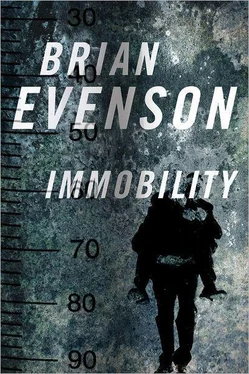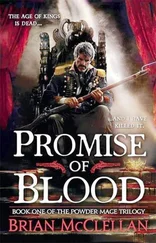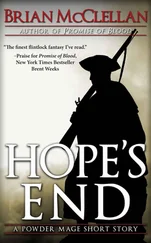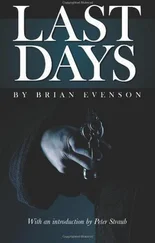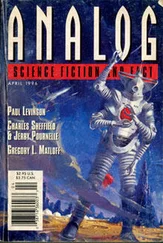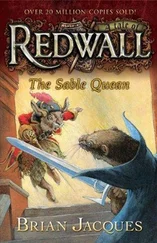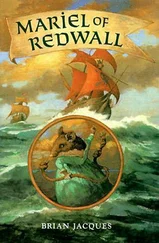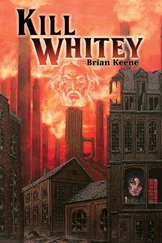“Find something to hold on to,” said Qatik, and thrust his hand out again.
There was a ladder beside him and he grabbed it with one hand. His gun was digging into his side so he took it out, balanced it on the ledge beside him. It was extremely hot inside, the air almost unbreathable. It was also very difficult to see. The only light was that coming up through the hatch and from an opening high above, a flap in the top of the roof, where the grain must have in the past been poured in. The backpacks flopped in beside him and then, suddenly, the light dimmed and, grunting, the black-suited form that was Qanik forced itself through. Once he was all the way in, he turned around and reached back out, pulled the hatch door closed with his fingers.
“Are you sure we’ll be able to open it again?” asked Horkai.
“Should be,” said Qatik, and then started up the ladder, nearly crushing Horkai’s fingers. Down below, beside Horkai, Qanik braced his legs against the inner edge of the hatch chute and dug through one of the backpacks, at last removing a fusee, which he cracked and threw down to rest on the hatch itself. It lay there, burning with a pale red light that cast wavering shadows all through the bottom of the silo. The acrid smoke made Horkai cough. Meanwhile, Qatik had climbed all the way to the top. Leaning far out, he pulled the upper opening closed.
Once he was down, the two mules untaped their hoods, careful to try to preserve the seal for later. They didn’t take them off, just slid them back on their heads so that their mouths were visible. Their chins, Horkai saw, were slick with sweat.
“Hungry?” asked Qanik. It was strange to watch someone talk when all you could see of their face was their mouth.
“This isn’t a good idea,” said Horkai. “The silo is going to fill with smoke.”
“We will not stay here long,” said Qatik. “We have enough air for what we need.”
“We will eat and then we will go,” said Qanik. He twisted the end off a metal cylinder and handed it to Horkai, motioned for him to drink. He did—water, warm and with a somewhat metallic taste. Qatik was already handing him a tin box that, when he opened it, he found to be full of hardtack.
“Pour some water into the box and wait a moment,” said Qatik. “Otherwise you will break your teeth.”
He poured the water in and waited. His eyes were burning from the smoke, making it difficult to see. He felt like he was suffocating.
“You’re certain I don’t need a suit?” asked Horkai. “You’re certain I’ll be all right?”
Qanik nodded. “You always have been,” he said. “If not, we’d already know.”
“How?”
“Skin rash at first, mild in the beginning but getting worse and worse. Then you would start to vomit blood. Around here, it wouldn’t take long for your skin to break into sores and ulcerate. If we were exposed to as much as you’ve been exposed to today, our circulation would be damaged and our hearts would fail.”
“Why hasn’t that happened to me?”
Qanik shrugged. “You are okay,” he said. “You always have been. You are not in any trouble.”
“We are the ones that are in trouble,” said Qatik.
“That’s why you’re wearing the suits,” said Horkai.
“They are not enough,” said Qatik.
“Not enough?”
“No need to talk about it,” said Qanik.
“But I want to talk about it,” said Horkai.
“You do not want to hear about it,” said Qatik.
“Both of you be quiet and eat,” said Qanik.
Horkai looked at the tin in front of him. The water had softened the hardtack, making it a little more flexible. He took a bite, found it tasteless, but managed to choke it down. He took a sip of water, another bite of the biscuit.
“I want to hear about it,” he said, chewing. “I want you to tell me.”
“Not a good idea,” said Qanik.
“He has a right to know,” said Qatik. As he spoke he ate, breaking off a corner of damp hardtack and chewing it. Both the mules, Horkai realized, were eating much more than he was, and eating much quicker.
Qanik shrugged.
Qatik turned to Horkai. Horkai watched his mouth moving just below the edge of the hood, the rest of his face hidden behind the shiny black fabric.
“These suits keep out only so much,” said Qatik. “They do not protect us completely.”
“So this will damage you?” asked Horkai.
“Not damage,” said Qatik. “Kill.”
“Kill? Then why are you doing it?”
“We are the mules,” said Qanik. “This is our purpose. This is what we were made to do.”
“Who told you that?”
“That is how it is,” said Qanik.
“But who told you?”
“Rasmus,” said Qatik.
Rasmus, thought Horkai. Always Rasmus.
“Can’t you do something?” he asked them. “Can’t you make better suits for yourself? Can’t we stop it?”
Qanik shook his head.
“What if we turned back now?”
“We are the mules,” said Qanik firmly. “This is what we do.”
“But—”
“What Qanik means,” said Qatik, interrupting him, “is that we are already dead. We have already been out too long. If we turn back, we still die, just not as quickly.”
“Don’t you care about that?”
Qanik shrugged. “We all have to die sometime,” he said. “Better to die doing what you are meant to do.”
“As mules,” said Horkai.
“As mules,” said Qanik, nodding.
Below them the fusee was sputtering, the shadows leaping more erratically. “Enough talk,” said Qatik. “Back in the hood, Qanik. Time to go.”
* * *
LATER, WALKING AGAIN but riding on Qatik’s shoulders this time, moving upslope and coming closer to the point of the mountain, the sun now threatening to set, he tried to raise the issue with them again. At first he tried to ease into it gently, tapping on Qatik’s hood to attract his attention.
“If you’re going to die anyway,” he asked, “why wear suits at all?”
Qatik’s response was muffled. Horkai leaned forward and swiveled one ear and then asked him to repeat it.
Qatik tapped his speaker to clear it. “If we did not wear our suits, we would already be dead,” he said. “We would not be able to achieve our purpose.”
“Why trade your lives for a purpose?” asked Horkai. “What makes that a worthwhile trade?”
Qatik slowed, briefly came to a stop. Qanik, to one side, turned slightly, raised an eyebrow behind the faceplate. “Why are you trying to make me doubt?” Qatik asked. “Why now, when it is already too late, when I am already dead, when my purpose is all that is left to me?”
He started up again, slow at first. Qanik fell into step beside them.
“And what if you convince us?” asked Qatik. “The best that can happen is for us to decide there is no point carrying you and leave you here, on the side of this roadway, to die.”
He had, Horkai had to admit, a point. Quickly, he changed the subject.
“If you’ve never been outside, how do you know what things are?”
“We had been as far as the founder,” said Qatik.
“Still,” said Horkai. “That’s not very far.”
“Pictures,” said Qatik. “We’ve been given instruction. We have seen maps. We were given scenarios and made to solve them.”
“But it was not always perfect instruction,” said Qanik. “You had, for instance, to help us to open the hatch on the cylinder.”
“The silo,” said Horkai.
“Silo,” they said in unison.
“Farming related, then,” added Qatik. “We saw many pictures and we memorized many things.”
“And among those pictures were images of farms?”
“No,” Qatik admitted. “Among those pictures were images of farming-related buildings.”
Читать дальше
